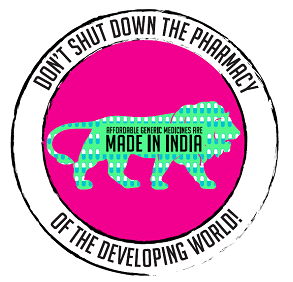 Dehli Network of Positive People
Dehli Network of Positive People
Press release, Link
Increasing IP barriers will have severe impact on generic medicines ‘Made in India’
Indian Prime Minister Must Resist Big Pharma Pressure to Trade Away Medicines
New Delhi, 29 April 2015: At a conference titled ‘IP as Frontline Tool for Make in India’, organised by the Federation of Indian Chambers of Commerce and industry (FICCI) to mark World IP Week, the Delhi Network of Positive People and the International Treatment Preparedness Coalition held a protest before Mr. Amitabh Kant (Secretary DIPP), Mr. Rajeev Agarwal (Patent Controller General) and Mr. N.K. Sabarwal (Convenor, IP Thank Tank), highlighting the negative impact of IP barriers on generic medicines ‘Made in India’.
lion picThe protest comes as Prime Minister Modi has expressed an intent to potentially change the country’s pro-public-health laws that support the production of affordable generic medicines ‘made in India,’ upon which millions of people in India and beyond rely to stay alive.
In 2001 the cost to treat someone with HIV fell by over 96 percent – from 10,439 dollars to 360 dollars – per person per year due to generic competition from India. Since then, India’s role in ensuring global access to life-saving medicines is considered vital, including HIV, TB, cancer and hepatitis. India is often referred to as the ‘pharmacy of the developing world’ because of its critical role in providing affordable generic medicines for use in India and across the world.
The Department of Industrial Policy & Promotion (DIPP) has recently launched the ‘Make in India’ Campaign, which has the potential to further promote and encourage the manufacture and supply of affordable generic medicines from India, but could also backfire if stronger intellectual property (IP) provisions are introduced as part of the effort.
“We are urging Prime Minister Modi to ensure the ‘Make in India’ Campaign works to support the manufacture and supply of affordable generic medicines,” said Vikas Ahuja, President of the Delhi Network of Positive People (DNP+). “Instead of seeking to abuse the IP system by bending the rules and claiming monopolies on older medicines, the pharmaceutical industry should focus on real breakthrough innovation, and the government should develop a framework that fosters generic competition in a way that also allows for affordable access. This is a dialogue that needs to happen, and we invite Prime Minister Modi to be a part of the solution, instead of being part of the problem.”
The powerful pharmaceutical lobby of patent-holding companies, backed by the United States Trade Representative (USTR), the European Commission, Switzerland and Japan are on a mission to change India’s status as the world’s pharmacy, feeling threatened by the growing technological ability of the Indian generic industry to compete.
Over the last year, there has been continuous bilateral pressure from the USTR, which in the long run may lead to IP measures that far exceed what is required under international trade rules in the World Trade Organization’s TRIPS Agreement. Such so-called ‘TRIPS Plus’ measures would undermine the hard-fought public health safeguards in India’s patent law.
Indian trade negotiators, DIPP policymakers and the judiciary are now under pressure to dilute the safeguards in India’s patent law, to blindly enforce patents at the cost of people’s lives, and to link the drug regulatory system to IP in order to block the registration of affordable generics.
In the past, India has maintained its position that in the area of pharmaceuticals, its laws are fully compliant with international trade rules and has withstood pressure from the European Commission and other developed countries to change its IP system. The government, policymakers and the judiciary have sought to balance the imperatives of the patent system with
the right to health and public health, by upholding the legal safeguards enshrined in the patent law and limiting the potential of pharmaceutical companies to abuse the system.
But worryingly, in a recent speech addressing the corporate sector, Prime Minister Modi hinted at bringing changes in India’s intellectual property system – “अब हम ग्लोबल पैरामीटर्स के इंटेलेक्चुअल प्रॉपर्टी राइट के दिशा में काम नहीं करेंगे तो दुनिया हमारे साथ नाता नहीं जोड़ेगी”.
“As people living with HIV who rely on a life-long supply of quality generic medicines to stay alive, we are intimately aware that IP barriers undermine the availability of low-cost, life-saving medicines ‘made in India’ and the future of the generic industry in India altogether,” said Loon Gangte, Coordinator of ITPC-South Asia. “After India started implementing the WTO
TRIPS Agreement ten years ago, we have watched with concern as new cancer medicines that have been patented one by one are being ‘merely imported’ in small quantities and launched at an exorbitant monthly cost of Rs. 1 lakh to 1.5 lakh (1500-2300 USD) per patient. In the absence of local generic production, caused by IP barriers such as 20 year product patents, there is
no ‘Make in India,’ and new cancer medicines are now priced out of reach of patients and publicly-funded cancer hospitals.”
The introduction of a product patent system in 2005 has made India dependent on expensive imported patented medicines, despite the existence of an indigenous pharmaceutical industry with the capacity of low-cost production. Already patent monopolies stop Indian generic companies from making many new drugs. Introducing additional IP barriers will not promote ‘Make in India’
in the area of pharmaceuticals.
Contact: Vikas Ahuja, +919312732495




